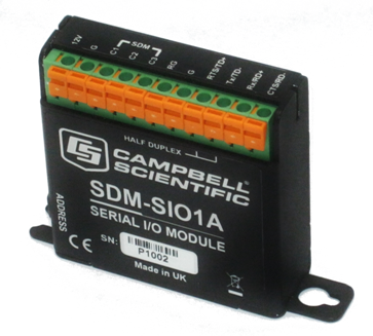






Overview
The SDM-SIO1A module connects to Campbell Scientific dataloggers using the SDM port and communications protocol.
The SDM-SIO1A module is designed to allow expansion of the number of serial ports available on a datalogger or communicating with intelligent sensors or driving external displays. The SDM-SIO1A is a functional replacement for the SDM-SIO1 interface, being slightly smaller in size.
Read More
Benefits and Features
- Allows up to 15 additional devices to be connected to a datalogger
- Can collect large amounts of data without hindering other processes within the datalogger
- Supports `talk-through' mode that facilitates testing and diagnostics
- Supports MODBUS and DNP3 communications
- Three year extended warranty available on this product
Images

Technical Description
It connects to a remote serial device using industry standard hardware that can be set to true RS-232, RS-485 or RS-422 signal levels. When operating in RS-232 mode it also supports hardware handshaking. RS422 mode is functionally the same as RS485 mode except the connection is limited to a point to point system. Connections and programming for RS422 are otherwise identical to RS485.
The SDM-SIO1A will accept serial data up to 6143 bytes and store it in its buffer. This allows remote equipment to transmit large amounts of data without needing to stop other processes in the datalogger.
Up to 15 SDM-SIO1As can be connected to a single logger using the SDM port, allowing the user to connect 15 different serial devices to their logger with ease. This is in addition to any connections made to the dataloggers via other serial ports.
Compatibility
Datalogger Considerations
The SDM-SIO1A does NOT support auto baud rate detection nor the use of the serial port for DNP or general PakBus communications.
Compatible Contemporary Dataloggers
| CR200(X) Series | CR800/CR850 | CR1000 | CR3000 | CR5000 | CR7X | CR9000X | CR6 |
 |
 |
 * * |
 |
 |
 |
Note:
*On the CR3000, SDMs are connected to the ports labelled SDM-C1, SDM-C2, and SDM-C3.
Compatible Retired Dataloggers
None of our retired dataloggers are compatible with the SDM-SIO1.
Enclosure Considerations
The SDM-SIO1 requires a desiccated, non-condensing environment; a Campbell Scientific enclosure is recommended. The SDM-SIO1 has built-in keyhole flanges for mounting to the backplates of Campbell Scientific enclosures.
Compatible Enclosures
| ENC10/12 | ENC10/12R | ENC12/14 | ENC14/16 | ENC16/18 |
 |
 |
 |
 |
 |
Specifications
Supported data rates
300, 1200, 2400, 4800, 9600, 19200, 38400, 57600, and 115200 bits/s
Supported modes of operation
RS-232 (Full duplex and receive only), RS-485 (Half and full duplex), RS-422 (Half and full duplex). Hardware CTS/RTS flow control is supported in RS-232 mode, the handshaking lines can also be used as general purpose I/O lines.
Supported data format
8, 7 bit data size*; none, odd or even parity; one or two stops bits.
* In 7 bit mode with no parity the user must ensure that the characters received by the SDM-SIO1A have a delay of at least one bit period or greater between them. This does not affect any other configuration and does not affect transmissions out of the SDM-SIO1A.
Miscellaneous information
• Auto baud rate detection is NOT supported
• Use of the serial port for general Pakbus communications is not currently supported
Buffer sizes
• Transmit buffer size: 767 Bytes (Buffer from the logger to the sensor)
• Receive buffer size: 6143 Bytes (Buffer from the sensor to the logger)
Both transmit and receive buffers are fill and discard type, i.e. once the buffers become full no new information is accepted and all further data is discarded until space is made when the logger requests data from the SDM-SIO1A.
Voltage specifications
Power supply +12V connection; 7V minimum; 12V nominal; 30V maximum
Current consumption
Standby current: 110µA nominal, 150µA max
Active current: 9.6-11.7 mA depending on transmit mode and connections made.
Temperature range
Standard range: -40°C to +70°C
(Contact Campbell Scientific Ltd for further extended temperature requirements)
Humidity
Standard range: 0% - 95% (non-condensing)
Physical parameters
Main body
Height: 64 mm (2.51")
Width: 62.5 mm (2.46") - excluding mounting tabs
Depth: 22 mm (0.86")
Mounting holes - two spaced 76 mm (3") apart
Optional DIN rail mounting clips are available which can be fitted to the base of the case.
EMC compliance
The SDM-SIO1A has been tested and shown to comply with IEC 61326. The device incorporates transient and surge protection that is designed to meet IEC61000-4-5, level 4, providing the device is adequately grounded.